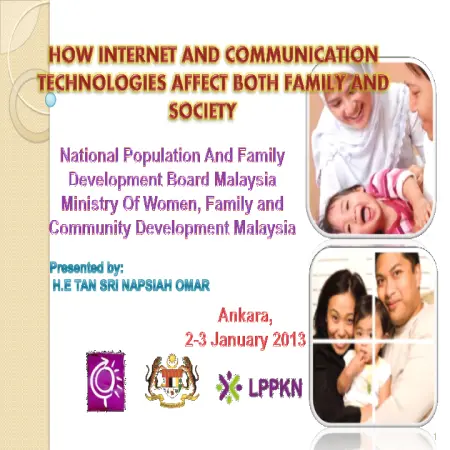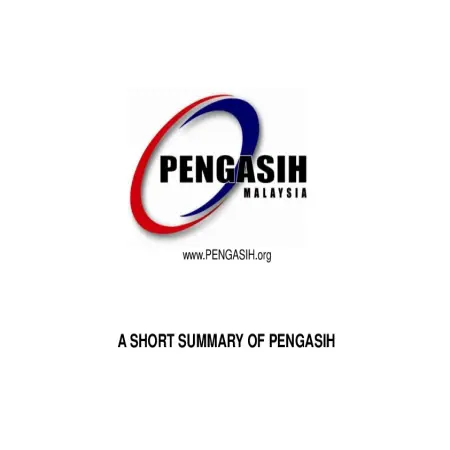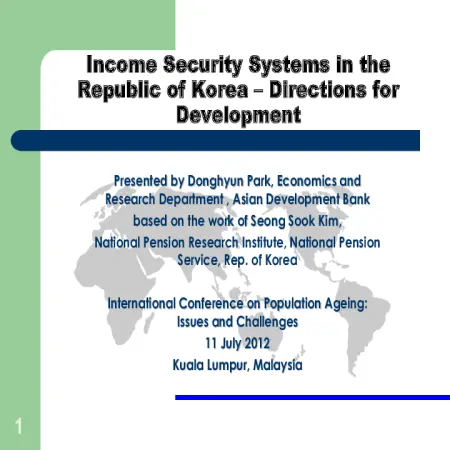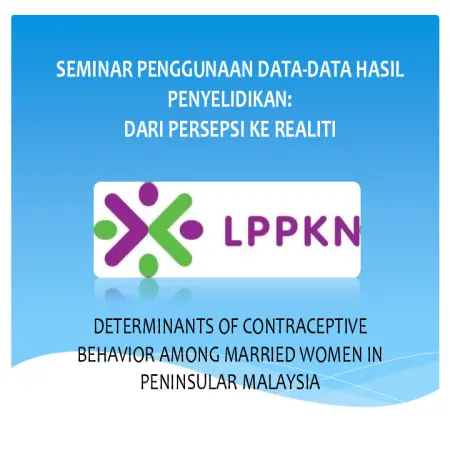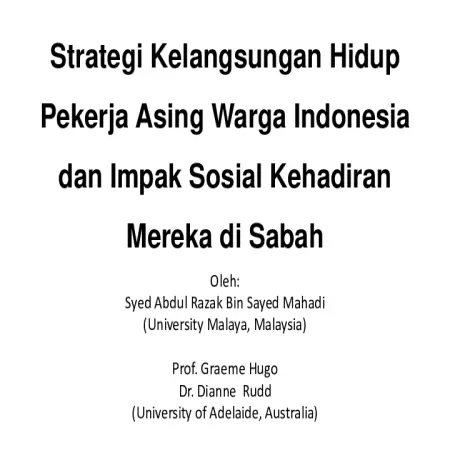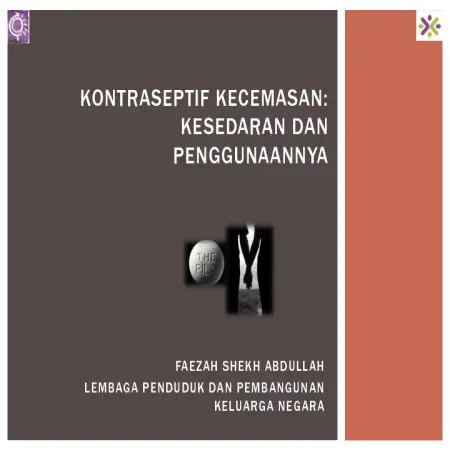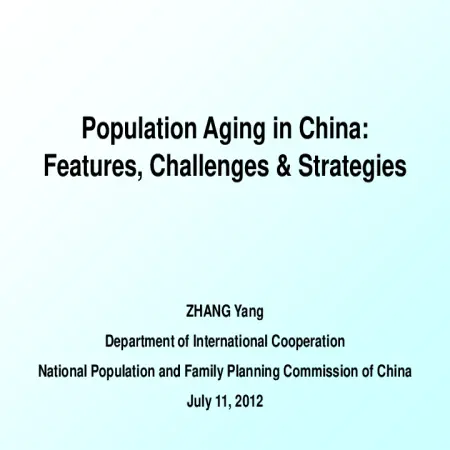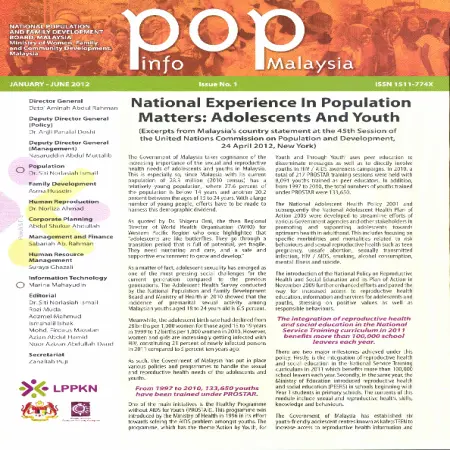TOPICS
|
|
How internet and communication technologies affect both family and society
Item Type: Conference or Workshop Item
Editor:
Year: 00/00/2012
Abstract: This slide presentation shares about 65.1% Malaysians using the internet more than 9 hours. The population of internet users is 17.5 million out of a total of 28.6 million. Broadband penetration is 65% of the population in 2012. The positive impact on family is to enhance communication, strengthens relationships, enable parents to work from home and monitoring of children. Meanwhile, the negative impact on family are such as internet addiction, weakening family relationship, “narcissistic” behavior, excessive self-admiration especially among teens. Playing on the computer in the long term can lead to addiction, ill tempered nature and becoming antisocial. Children also can become more aggressive due to expose to violent games.
|
|
|
|
|
|
A short summary of Pengasih
Item Type: Conference or Workshop Item
Editor:
Year: 00/00/2012
Abstract: This paper discuss about a short story summary of PENGASIH. Persatuan PENGASIH Malaysia is registered as an NGO in 1991. Our main activities for the past 22 years are Rumah PENGASIH which is a rehab and treatment centre for recovering addicts using the Peer-Pressure Community System. Seruan Kasih refers a continuous drug intervention and prevention campaign to students, youth and communities. Sidang Kasih is a monthly Family Support Group for family members of recovering users. Teduhan Kasih refers to half-way houses for recovering users to re-enter their mainstream societies by way of work, schooling and training. Finally, Khidmat Kasih is an economic projects towards self-sustenance for PENGASIH and members of PENGASIH.
|
|
|
|
|
|
Income security systems in the Republic of Korea? Directions for development
Item Type: Conference or Workshop Item
Editor:
Year: 00/00/2012
Abstract: The four goals of public pensions - extension of coverage, provision of adequate benefits, an equitable share of costs between generations, and financial stability - are all important. However, as these four goals conflict and influence one another, it is difficult to attain them simultaneously. Therefore, it is necessary to compromise these goals at a certain level. National Pension in Korea has been developed within an astonishingly short period. However, coverage is still unsatisfactory and long-term financial state is unstable. These two issues seem to be the most urgent reform priorities. The former may be the most important issue because National Pension exists for the income security of people. Meanwhile, adequacy of benefit was partly relaxed through two reforms. Though long-term financial stability and equity between generations have been improved through some sacrifice of benefit level, these issues are still regarded as unresolved and need additional measures in Korea, one of the most rapidly ageing countries. In this paper, we examine the four major goals of National Pension, namely coverage, adequacy of benefit, inter-generational equity, and long-term financial stability. The coverage of the scheme should be extended and the average contribution period should be increased. Coverage must increase 10% by 2030 in terms of the ratio of old age pensioners to total old age people aged 65 and over. The benefit level of the National Pension may be targeted to 30% of average earnings in real term as of 2030. Other sources of old-age income can be from working, private pensions, and savings. For more stable finance and better equity between generations, we review four financial goals.
|
|
|
|
|
|
Determinants of contraceptive behaviour among married women in Peninsular Malaysia
Item Type: Conference or Workshop Item
Editor:
Year: 00/00/2012
Abstract: Modelling the trends and patterns of contraceptive use have drawn great interests among researchers worldwide but the case is not so in Malaysia. This study models the relationship between contraceptive use and several socio-demographic factors that include age at first marriage, ethnic group, level of education, employment status, place of residence, and number of life birth, of married women in Malaysia. The objectives of this study are; to describe the trend of contraceptive behaviour according to socio-demographic factors that affect their decision in contraceptive practices and also to identify determinants of contraceptive use among married women in Malaysia. Based on the trend analysis, the study indicates that there is an increasing pattern of women delaying marriage. The general trend of contraceptive use also indicates that there have been changes in the behaviour of users according to selected socio-demographic characteristics across these surveys. Specifically, Malay women are more likely to practice family planning compared to Chinese and Indian women. The overall trend across ethnic group shows that Malay contraceptive users’ behaviour were in contrast with that of Chinese users in most aspects. Favourable contraceptive methods among Malaysian women were oral and traditional methods. Binary logistic regression was applied to identify the determinants of Malaysian women’s decision in birth control practice. Multinomial logistic regression was also applied to estimate the probability of favourable contraceptive method among these women in their contraceptive practice. Based on this study, it is found that among all selected socio-demographic characteristics, women’s employment had no significant effect on women’s decision in contraceptive practice and their choice of contraceptive method. This study has also discovered that women’s age, their age at first marriage, women’s desire to have more children, number of pregnancies, educational attainment, and ethnicity are determinants that significantly influence Malaysianwomen’s decision towards contraceptive practice and their choice of contraceptive method.
|
|
|
|
|
|
Pengkelasan keberkesanan perancang keluarga menggunakan pepohon keputusan
Item Type: Conference or Workshop Item
Editor:
Year: 00/00/2012
Abstract: Awareness of the importance of family planning practices for a family institution in Malaysia began around the 1960s. In order to plan family size it is important to determine the appropriate and effective method of family planning. Therefore, this study was conducted to develop a best classification model and identify the factors of effectiveness of such methods and also for women who do not use any family planning method, factors that influence the effectiveness of non-use of methods are also identified. Classification techniques in data mining were used to obtain patterns of effectiveness of the family planning methods used. The classification techniques used are result trees J48, ID3, Random Tree, REPTree and Bayes classifier Naive Bayes. Secondary data from the fourth set of the Malaysian Population and Family Survey (MPFS) obtained from the National Population and Family Development Board (LPPKN) were used in this study. To obtain the best classification model, 10-fold cross validation method, Weka and Mynda applications were used. The test results found that the J48 result tree was selected as the best classification model because this model provides the highest accuracy values for both data sets of 87.83% and 80.42% compared to other techniques. The study has produced a decision tree that can generate a set of tips to identify the effectiveness of family planning methods used and a set of tips to identify the effectiveness of those who do not use family planning methods. In conclusion, this study does not cover women who are using family planning methods and it is hoped that future studies will cover the effectiveness of the method for women who are using family planning methods and make pattern comparisons based on MPFS 1, MPFS 2, MPFS 3 and MPFS 4 data sets.
|
|
|
|
|
|
Strategi kelangsungan hidup pekerja asing warga Indonesia dan implikasi sosial akibat kehadiran mereka di Sabah
Item Type: Conference or Workshop Item
Editor:
Year: 00/00/2012
Abstract: Sabah's direction focuses on the development of 3 main sectors such as agriculture, tourism and manufacturing to drive the economy. As an agro -economy -based state, the 2010 census recorded 30 per cent of the total workforce engaged in the agricultural sector. As locals are not interested in seizing employment opportunities in the 3D -based agriculture and plantation sector (Difficult, Dirty & Dangerous), job vacancies are filled mainly by Indonesian workers as shown in data obtained from Temporary Work Visit Passes (TWVP). Certainly, their presence has social implications for the state of Sabah which housed 27.7 percent of the foreign population in 2010. Therefore, a micro study needs to be conducted to understand and analyze this situation. A joint study was conducted with NPFDB, in which a total of 896 respondents consisting of Indonesian workers from the plantation, manufacturing, construction, services and informal sectors were interviewed in a survey in the Tawau Division in 2010. In addition, primary data were also collected from interviews. Conducted among legal and illegal employees as well as based on the researcher’s observations. Interviews with government officials directly involved with the management and recruitment of foreign workers were also conducted. Secondary data were obtained from various government agencies in Sabah such as the Immigration Department, Manpower Department, Statistics Department, Health Department and Education Department. This study successfully identified 5 survival strategies that are often used by Indonesian workers to ensure the success of their migration, namely family networking, choice of residence, cultural adaptation and assimilation, economic survival and involvement in social and political institutions. Of course, the implementation of this strategy has a social impact on the local people. Important findings of this study show that most Indonesian workers come to Sabah with family members. Certainly the presence of spouses and children has huge implications for social facilities especially health and education. Therefore, there must be integration between the entry of foreign workers with Sabah's development planning, especially if the dependence on foreign labor continues until Sabah achieves the status of a technology - intensive economy in the future.
|
|
|
|
|
|
Kontraseptif kecemasan: kesedaran dan penggunaannya
Item Type: Conference or Workshop Item
Editor:
Year: 00/00/2012
Abstract: Emergency contraceptive (EC) is one of the methods of contraception used after unprotected sex. With proper use, this method of emergency contraception can help reduce the problems of unplanned or unwanted pregnancies that have been frequent in recent times. The objective of this study was to identify women’s awareness of emergency contraceptive methods and their level of use. The research method involved the distribution of questionnaires to 1000 women, aged 15 to 49 years, who attended programs organized by NPFDB. Data collection and analysis was carried out using SPSS 11.5 software. The chi -square test was used to study the relationship between the sociodemographics of the respondents and the variables studied. The coverage of the study consisted of 84% Malay women, and was followed by Indians (9%) and Chinese (6%). The majority of respondents (43%) were in the range of 25 to 34 years, with a mean age of 33 years. Contraceptive use among respondents was found to be 26.3%, of which 98% were married women. The study found that women’s awareness of EC and its level of use was low, being only 29% and 3.9%, respectively. The chi -square test results showed that the level of awareness of EC increased with age (p <0.05). In addition, more highly educated women were found to have heard of EC (p <0.05) compared to low levels. Most EC users are from the married group. Nearly 70% of women who are using contraceptives are found to have used EC. Among women who have never used EC, only 21% are interested in using it in the future. However, the majority (70%) support this service provided at NPFDB. The lack of exposure on EC results in the number of women interested in using it being low. Therefore, NPFDB and related parties need to enhance promotional activities, advocacy and learning of emergency contraceptive methods, in addition to other methods, so that the community knows about it and can use it during emergencies.
|
|
|
|
|
|
Population aging in China: features, challenges & strategies
Item Type: Conference or Workshop Item
Editor:
Year: 00/00/2012
Abstract: Global response to population aging is confronted by a series of severe challenges, for example retirement and medical/caring costs adds to fiscal burdens, population aging withers the labor force, development and aging problems intermingle as growth of the aged population mostly takes place in developing countries and poverty of the aged remains an acute problem. All these issues may only be addressed when national governments all over the world take the needs of the aged into full consideration in developing their social policies, establish specific strategies for responding to population aging and incorporate such strategies into long-term national development frameworks. Population aging also reflects the progress and achievement that the human society has made in extending life expectancy, improving mother and child health and helping women realize family planning. Seniors are more than just beneficiaries of social welfare. As producers, consumers, spreaders of traditional cultures, care-takers of children in their families and communities, seniors also play positive irreplaceable roles. A shared goal for us all therefore is to regard aging as an achievement, respond to age-related issues with a positive, optimistic and rational altitude, view skills, experiences and resources of the elderly as capital of the social development course, incorporate aging into our development agendas, promote positive aging and thereby construct a sharing society regardless of age.
|
|
|
|
|
|
National experience in population matters: adolescents and youth
Item Type: Newsletter
Editor:
Year: 00/00/2012
Abstract: Adequate and accurate sexual and reproductive health information helps young people to make informed and responsible decisions. Howewer, cultural and religious sensitivities within the communities remain one of the major challenges in implementing reproductive health education for young people. Parents are still uncomfortable talking about reproductive health matters with their children ,leaving their children dependent upon information from their peers or other sources like the internet. The Government of Malaysia takes cognisance of the increasing importance of the sexual and reproductive health needs of adolescents and youth in Malaysia. Hence, the Government of Malaysia has put in place various policies and programmes to handle the sexual and reproductive health needs of the adolescents and youths. One of the main initiatives is the Healthy Programme without AIDS for Youth (PROSTAR). The Government of Malaysia also has established six youth-friendly adolescent centres known as kafe@TEEN to increase access to reproductive health information and services for young people aged 13 to 24 years.
|
|
|
|





